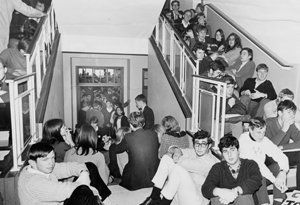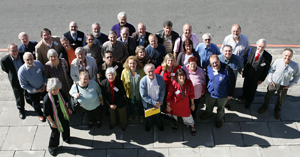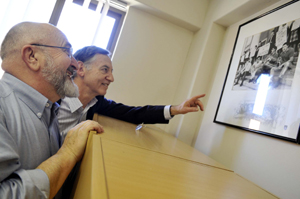1968, how and why
25 August 2008 |
The story is a familiar one by now.
In 1968, UCT Council approved the appointment of one Archie Mafeje, a UCT and Cambridge graduate, as senior lecturer in the Department of Social Anthropology.
It was a bold move on the Council's part, as universities at that time were not allowed to appoint black academics in any field other than African languages. The Minister of Education got word of the appointment, however, and - holding the university purse strings - strong-armed Council into withdrawing the offer to Mafeje.
It was bare-faced blackmail on the state's part, and was a stain on UCT reputation, says Dr Ken Hughes of the Department of Mathematics and Applied Mathematics, who took part in the sit-in.
"It's never a good thing to give in to a blackmailer," said Hughes at the recent symposium hosted by the Academic Freedom Committee (AFC). "In a hostage situation, nobody's hands stay clean."
Council's about-face amounted to an act of "collusion between the apartheid state and the University of Cape Town," commented Professor Fred Hendricks of Rhodes University at the AFC symposium.
Within days, following a mass meeting, some 600 students occupied Senate Room, intending, recalls Duncan Innes, president of the 1967/68 Students' Representative Council (SRC), to linger no more than a few hours.
They stayed for nine days (although student numbers dropped off each day). Security Police kept an eye on students from day one; occasionally infiltrating the group, it was discovered later.
Staff and other universities joined in the protests, among them Rhodes, Wits and Natal.
Prime Minister BJ Vorster was not amused.
"The Government and I will not tolerate this," he is quoted in one source. "I want to make use of this opportunity to tell the councils of the universities concerned: I will give you a reasonable time for solving the things going on at the Universities of Cape Town and the Witwatersrand yourselves, but if you do not do it, I will do it thoroughly and effectively."
At Bremner, pressure mounted on the students, primarily from the state and the police, who had been joined by students from the University of Stellenbosch. After Vorster's threat to send in "his boys", many felt it was time to bring the sit-in to a halt.
"We realised we were up against the machinery of the entire apartheid state," says Innes.
 |
| Then and now: Some of the students who staged the 1968 sit-in marched on Bremner again last week. |
Last week, some 60 members of the sit-in group assembled in the self-same Senate Room to recall and evaluate the event.
Innes concedes that the sit-in failed to reach its main objectives - to get Council to join them in their protest against the attack on academic freedom by the state, and to get Mafeje appointed.
 |
| Good old days: Graduates Stan Kahn and Duncan Innes, here at the SRC offices, spot themselves in a picture taken during the 1960s. |
"But what we did was make it clear to UCT and other universities around the country that they couldn't make a deal with the government, because then they would face opposition from students. We made it clear that Mafeje would not be forgotten, and the incident would be forever linked to the denial of academic freedom."
There were more personal consequences. Some of the students went on to join other, bigger, protest movements.
"For many of us it was a transformative process."
 This work is licensed under a Creative Commons Attribution-NoDerivatives 4.0 International License.
This work is licensed under a Creative Commons Attribution-NoDerivatives 4.0 International License.
Please view the republishing articles page for more information.







